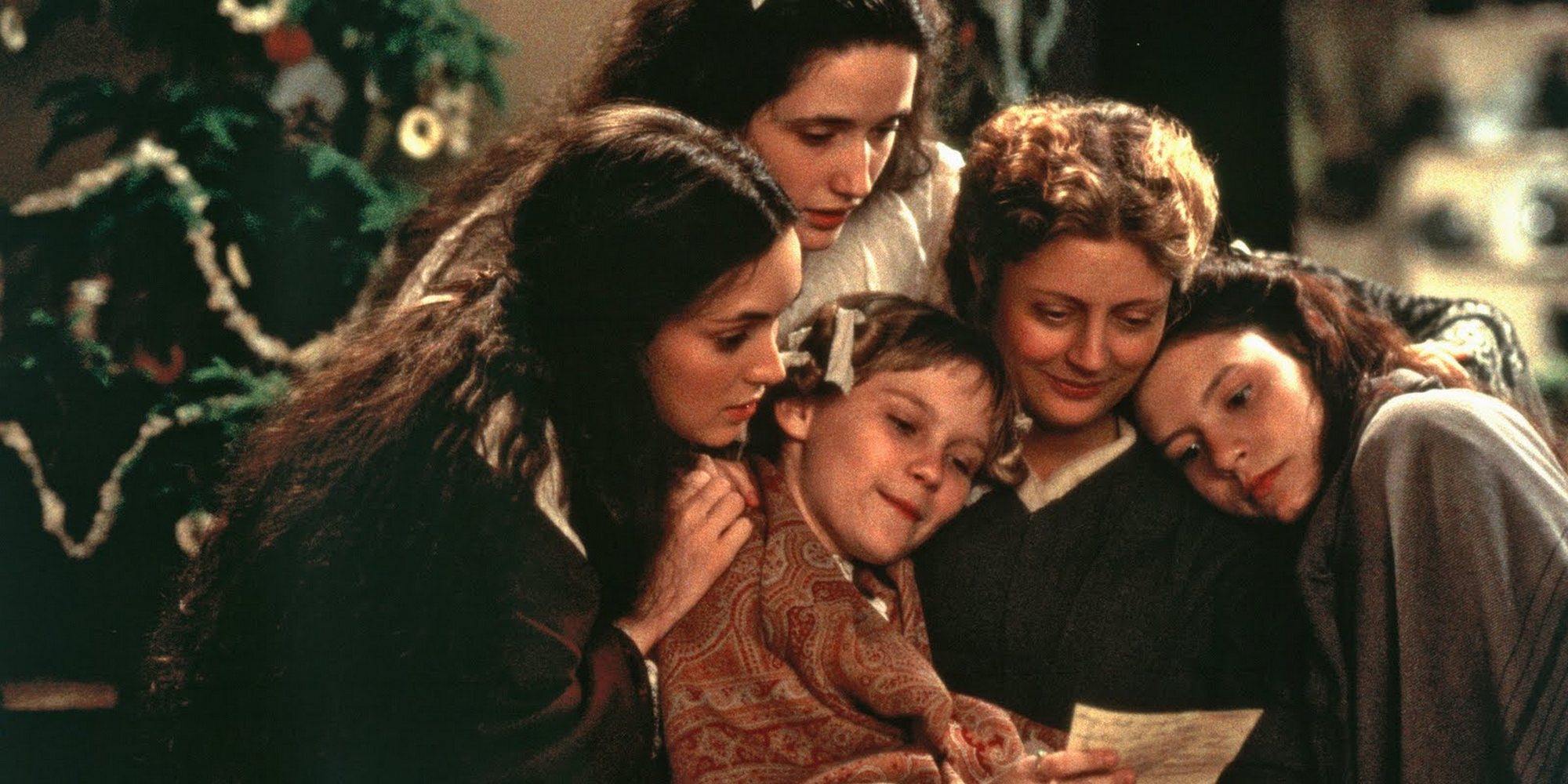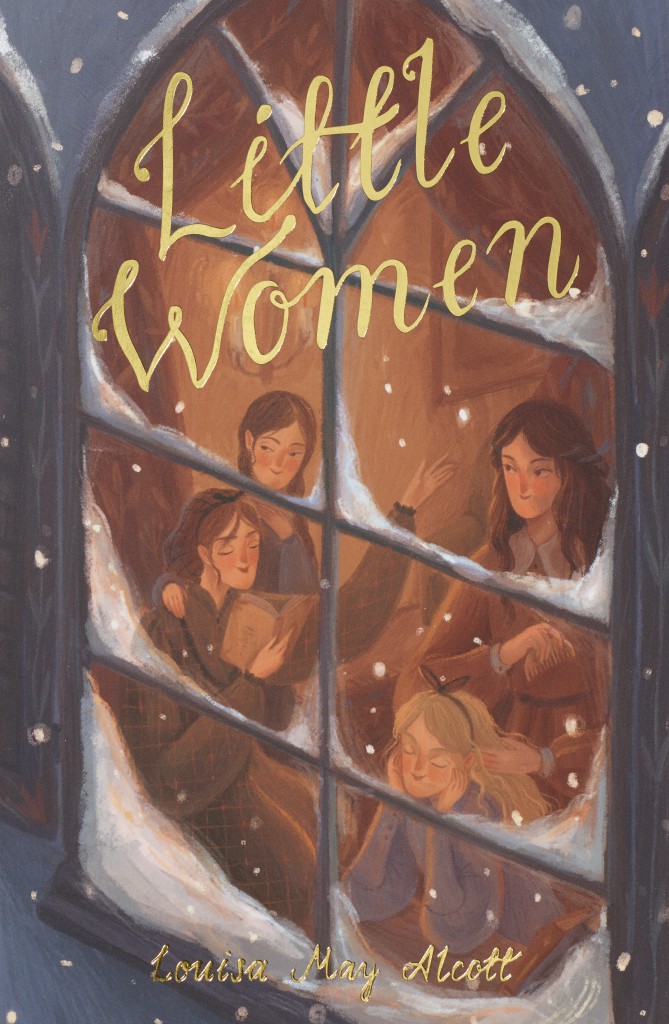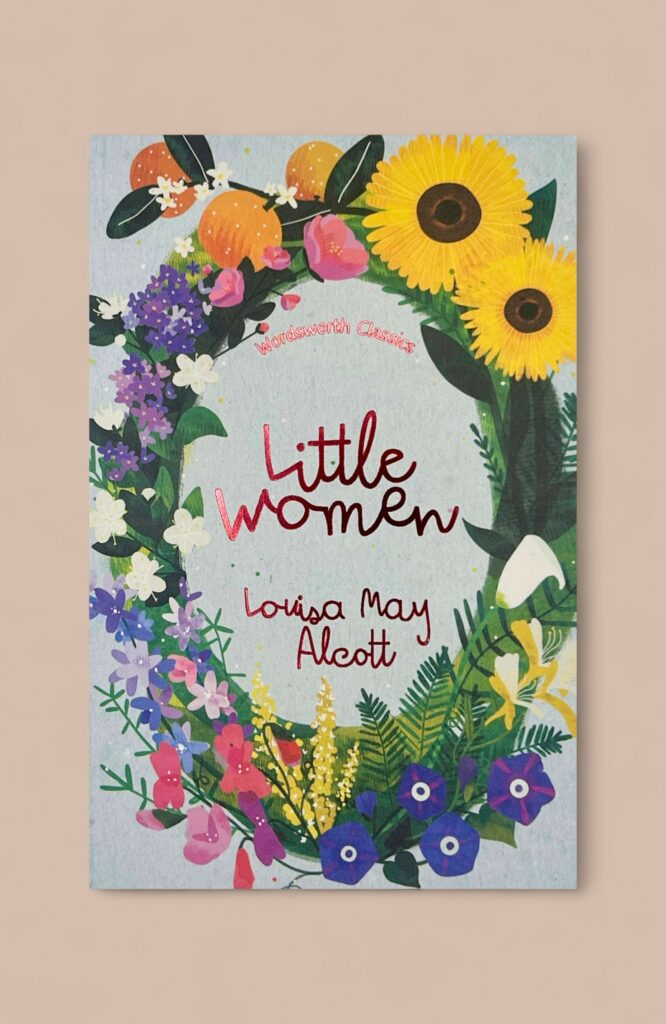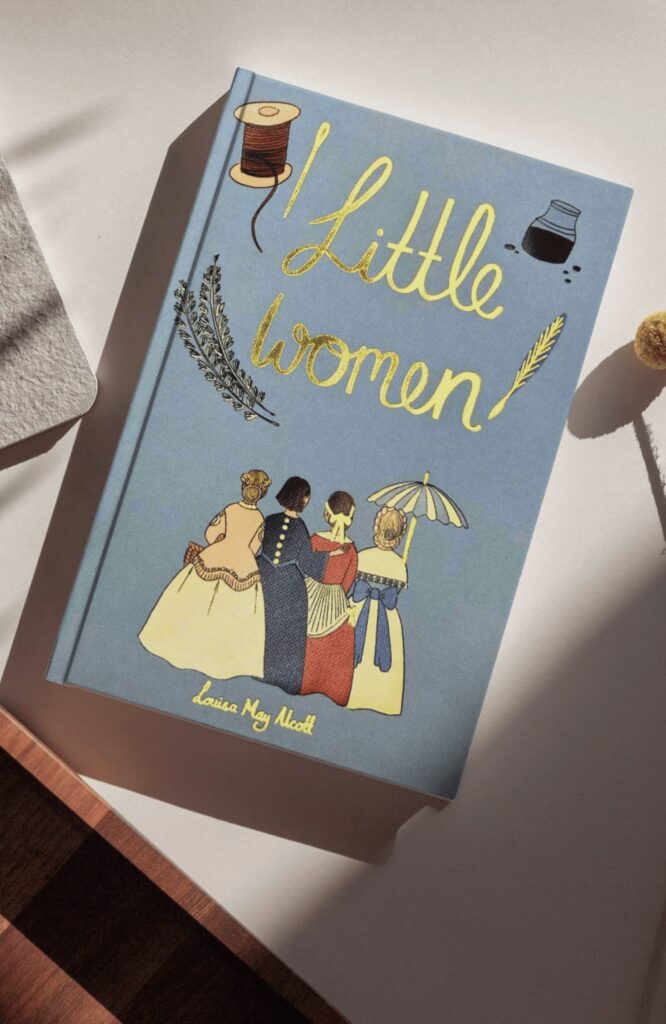
World’s Greatest Love Story?
Stefania Ciocia writes on ‘Little Women‘ on the Big Screen Part 2
There are two major, significant tweaks in Gillian Armstrong’s 1994 film version of Little Women: the narrative becomes Jo’s from the get-go in Winona Ryder’s voiceover, while the autobiographical inspiration behind the novel is unpacked from the fictional material. Both decisions deliberately conflate Jo March with her author in a script that includes details of Louisa May Alcott’s life left out of the original story. According to Hollinger and Winterhalter, screenwriter Robin Swicord “render[s] not so much Alcott’s novel as a contemporary [feminist] myth of that novel”.[1] I can see why the two scholars think so, but I don’t entirely agree. In fact, in many ways, this is quite a conservative film.
For example, the girls’ agency is nicely highlighted when – as in the 1949 version – they decide to give their Christmas breakfast to the Hummels, instead of being nudged to make the charitable gesture by Marmee. At the same time, though, the sisters display an early concern for romance that was absent or merely hinted at, in the previous two films. Kirsten Dunst’s Amy – the best Amy yet: right age, right temper tantrums – is hardly off the narrative starting blocks when she makes her bold assertion that she doesn’t intend to marry a poor man, while Meg (Trini Alvarado) fears that she’ll never have a suitor after Jo burns a lock of her hair.
Conversely, a feminist charge is injected in the script by exchanges that would never have found a place in the original. Marmee (Susan Sarandon) embarrasses Meg with her mention of corsets in front of a straitlaced Mr. Brooke (Eric Stolz), whose pious hunch that the girls will have a refining influence on Laurie is being dismantled, as he speaks, by the three younger sisters’ scrapes with his charge. John Brooke is a figure of fun in several of his assertions: my favourite is not his highly observant understatement that “the young ladies are unusually active”, but his later comment to Laurie that “over the mystery of female life there is drawn a veil best left undisturbed”. Young Laurie had better look up to a different tutor for his sentimental education.
Further nefarious effects of corsets and other feminine paraphernalia are illustrated in Sallie Moffat’s coming-out party, where Meg acquiesces to getting dolled up in spite of her better knowledge of the politics of cotton and of silk. It is here that we learn that Mr March – a thinly disguised Bronson Alcott – objects to his family wearing certain fabrics because their production relies on the exploitation of slaves. The same scene shoehorns another piece of information about the real-life Mr Alcott: a progressive educator, he did take on an African American pupil and was eventually forced to close his school because of his unorthodox pedagogical methods.
Needless to say, Mr March is a more enlightened teacher than “Young ladies, my eye is upon you!” Mr Davis who, in the aftermath of Amy’s lime-gate, is reported to have remarked: “it’s as useful to educate a woman as to educate a female cat”. Definitely no apples for Mr Davis, whose gender bias extends to human beings and felines alike.[2] Equally unsubtle is Marmee’s response to the news that Sally’s party has set in motion a flurry of gossip about Meg and Laurie: “Nothing provokes more speculation than a woman enjoying herself”. It’s a good line, but not entirely convincing unless Marmee is Susan Sarandon – though I still reckon this kind of in-your-face retort belongs more to Thelma and Louise than to Little Women.
It’s funny how I don’t feel the same regarding Jo’s virulent anger at the spiteful burning of her manuscript, an episode excised in the previous two film versions since they simply don’t have the heart to show this appalling low-point in Amy’s characterization.[3] The worst that Alcott’s Jo can do is cry “in a passion of grief and anger, – ‘You wicked, wicked girl! I can never write it again, and I’ll never forgive you as long as I live’”. Winona Ryder is given stronger material to work with, ranging from “I’m going to kill you” to “I hate you”, “You’re dead”, “You’re nothing” and “I never want to see you again”. We can all agree that this is a more likely response, teenage sister to the tweenage monster.
This good, angry work is undone, sadly, in the resolution of the conflict after Amy’s skating incident. Once Amy is fished out of the icy water and tucked under a mountain of blankets in bed, the girls all huddled around her. Sisterly love rules once more but, and this is what sticks in my throat, Amy is shown to be helping Jo reconstruct her novel. It’s a failure of nerve in a bold, gutsy take on this pivotal episode, whose own restoration to the economy of the story had been long overdue.[4] The script gives with one hand and takes away with the other, minimizing and trivializing Jo’s loss, and the ensuing outburst of righteous rage with it.
Paradoxically the real triumph of this film is its eye-opening representation of Laurie: Christian Bale’s fresh-faced boyishness is lit up by his interactions with the neighbouring girls, and by his conspiratorial camaraderie with Jo in particular. If anything, their easy companionship and – let’s be honest – the fact that Bale is ridiculously handsome makes it quite hard to believe that Jo, or any of her sisters, would not have a crush on him. But Bale’s youthful charm, with hints of privileged self-entitlement and laziness, is the least interesting part of his story. What the film shows us is that Laurie is a prisoner to societal expectations of his gender and class, just as Jo and the girls are confined by traditional notions of femininity and by their relative poverty.
Laurie is in a cage of his own: a gilded one, for sure, but still a cage. He would like to pursue his music, but is not allowed to, and must devote himself to more serious activities. His conversation with Jo about whether he has packed his Dickens to take with him to Harvard works both ways: while Jo regrets her lack of opportunities, and expresses her wish for expanded intellectual horizons, it’s obvious that Laurie would be equally happy to trade places with her. College is not an enticing prospect for an aspiring musician. Laurie’s thwarted artistic ambitions will be center stage again later in a frank, and deliberately brutal, conversation with Amy (Samantha Mathis) about the mediocrity of their respective talent. This happens at a time when the youngest of the March sisters is finally in a position to cultivate her skills as a painter.
By then Amy and Laurie are both in Europe: she as a companion to Aunt March, and he on a mission to recover from Jo’s refusal to marry him. The fact that Amy is on the brink of capitulating to Fred Vaughan’s attentions and settle for a convenient match, baits this decadent, cynical, heartbroken Laurie – his dandification semaphored by a foppish goatee. Laurie’s and Amy’s relationship is the one that needs to be smoothed over in this version of the novel, in spite of having been clunkily telegraphed much earlier on. When Beth had got ill with scarlet fever, little Amy had to be quarantined at Aunt March’s, and it had fallen to the ever-attentive Laurie to take her there in his carriage. This “carriage scene” had me groan in despair: Amy’s maudlin musings about her own mortality boil down to the wish not to die before she has been kissed, a sad eventuality which Laurie promises to dispel. He’ll be there to kiss her, should the need arise. The foreshadowing of their future relationship feels like an insult to the viewers’ intelligence, and ratches up the sentimental rating of this adaptation to dangerous levels.
Here’s the thing, and my main reservation about this film: while posters for the 1949 version had the baffling strapline “World’s Greatest Love Story!”, it is in this allegedly liberated adaptation of Little Women that romance plots of various guises dominate the story with the dubious facility. Meg and John fall in love practically at first sight and don’t need Aunt March’s opposition as a catalyst for their union. Worse still – in fact, the ultimate treachery – Jo and Professor Bhaer’s courtship is much more explicit than in the novel.
Apart from the melodramatic detour necessitated by Beth’s death (played by a luminous Claire Danes), the second half of this film – which would have fitted the title of Good (Husbands and) Wives – is to all intents and purposes a “will they / won’t they?” narrative about the two remaining couples. But, wait: in the case of Jo and Professor Bhaer (a very un-bear-like Gabriel Byrne, whose maturity and sophistication are no match for the Laurence boy), it’s a case of “will they / won’t they again” since their romance is already in full swing in New York City.
These details have pushed me the closest I have come to walking away from any of these films: Jo and Professor Bhaer’s kiss at the opera (anathema!) and their domestic arrangements at the boarding house, where Friederich lovingly brings Jo morsels of food so that she can carry on writing uninterrupted. [5] It’s not that I object to a kind man being solicitous to his young lover. It’s where (and how) this support happens in the story. It is premature. Besides, I cannot help but read Bhaer’s offer of an orange to Jo as a metaphor for his desire that she should change her literary tastes: from the crunchy, seductive, passionate apples and thrillers to the more wholesome, one-of-your-five-a-day Vitamin-C-packed sentimental stories in which she – granted – does find her true voice.
In this whole sorry mess of self-improvement, what does work is the emphasis on the similarities between Laurie and Jo. They both need to prove themselves worthy of their partners, the now mature-beyond-her-years Amy and the older mentor-like Professor. And, interestingly, they both need to shed a veneer of artificiality. Laurie shaves his goatee, grows a more respectable moustache, quits loafing about and goes to London to work in his Grandfather’s business, while Jo abandons her mercenary thrillers and learns to write about what she knows. (The metafictional twist is that the book that Jo publishes is not My Beth, but rather Little Women.) The one redeeming factor in the second half of the story comes at the very end, where Jo basically hires Bhaer to work in the school she plans to set up at Plumfield. Note that setting up the school is not entirely Jo’s idea: the all-knowing Marmee has planted the seed for this enterprise.
Part of me feels churlish in criticizing this film. Its heart is in the right place, I think. I’d be much happier to gloss over its emphasis on the two romantic plots if it didn’t try so hard with its feminist messages elsewhere. Look at Marmee: there is nothing that this super-human woman doesn’t understand and can’t do. She saves the day, and Beth’s life, when she comes back from Washington dispatching instructions on how to bring the fever down. Mother’s love and wisdom are more effective than all the doctors in Concord.[6] And Jo holds her own with Professor Bhaer’s learned pupils, talking about the 15th amendment and women’s suffrage. I genuinely have mixed feelings about these scenes: can we not take them for granted? Am I missing the point here? To me, they feel worthy and ham-fisted. I like my feminism served more subtly, and maybe that’s my problem, not the films. I wonder.[7]
It’s odd, then, that such a militant adaptation should have the most romantic finale of them all: under the umbrella, Bhaer demurs “My hands are empty”, and Jo replies “Not empty now”, placing hers in his. Cue soaring, swelling music. And I am sold. (It’s the bloody trumpets: they get me every time.) Tell you what, though: the Little Women I hope to see next year is a film where the greatest love story is the one between the sisters, who welcome loving, supportive partners into their fold. They are the harbingers of a matriarchal society where domestic bliss extends to elective family ties such as the ones fostered by Jo at Plumfield. Pretty please Greta Gerwig?
[1] Karen Hollinger and Teresa Winterhalter, ‘A Feminist Romance: Adapting Little Women to the Screen’, Tulsa Studies in Women’s Literature, 18.2 (1999), 173-92.
[2] The caricature of Mr Davis, complete with bubble-speech, for which Amy is punished in the 1949 film version is taken straight out of the novel. There, however, it is the brain-child and marks the downfall of Suzie Perkins, one of Amy’s fellow pupils.
[3] In our discussion on Little Women at the Folkestone Book Festival two weeks ago, several participants mentioned the burning of Jo’s manuscript as one of the most memorable passages in the novel. The episode also repeatedly – and understandably – came up when I asked whether it was only me who had hated Amy with a passion as a child. (The answer was ‘no’, by the way.) A woman explained that, in Jo’s place, she’d have never forgiven Amy. She’d still not be speaking to her now. I know what she means. That said, in their anonymous written feedback to me, a couple of people admit that our discussion has given them a new perspective on Amy, whose own similarity to Jo I myself have come to appreciate only with time.
[4] In her frank confession about how she would have reacted in Jo’s place, the woman mentioned in the footnote above said that she would have let Amy drown. She got one of the biggest laughs – and there were a few – in our lovely discussion. Disclaimer: none of the participants to that bookclub (or any of the other bookclubs in which I may get involved hereafter) condones any kind of violence.
[5] The man can’t afford to buy tickets, but he must have friends in the theatre: his date with Jo takes place in the wings above the stage, amongst pulleys and counterweights. This presumably gives a bohemian edge to the Professor, whose funny foreign ways have previously manifested themselves in the wickedly strong coffee he brews for Jo. On the other hand, the two bond over their shared love of Walt Whitman, and transcendentalist philosophy, which – again – gets explained to the viewers in another supremely didascalic moment in the film.
[6] Another really odd, small change to the plot is that Mr. March is wounded in the Civil War, instead of being taken ill. Why do we need a more martial Mr. March? What was wrong with the domesticated original version? Are we meant to castigate him for getting in trouble – silly boy – for wanting to play the soldier? I have no idea.
[7] About a month ago, I watched the film again with some of my students after one of our regular classes. Judging from their response, they like their feminism more subtle too. Something else that I have learnt from my current students is that Amy has her fans: a sizeable proportion of these twenty-something first-time readers of Little Women have latched on her fundamental similarity to Jo, as have the participants to the event at Folkestone. Following our discussion, the book-club crowd have also changed their opinion of Laurie. As I have explained here and in my previous pieces, my own opinion of these two characters is no longer the same I held as a child, or even twenty or ten years ago. It’s amazing how my relationship with Little Women keeps on changing with me as I grow older and, one hopes, wiser.
Books associated with this article

Little Women & Good Wives (Children’s)
Louisa May Alcott

Little Women & Good Wives
Louisa May Alcott

Little Women (Collector’s Edition)
Louisa May Alcott
